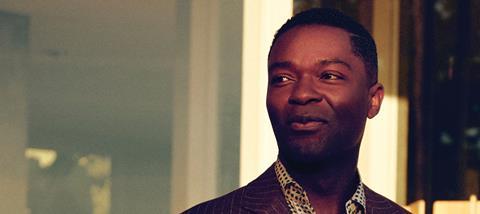The British actor opens up about his faith, his doubts and why handling critical reviews is so tricky for him

As a much in-demand actor, David Oyelowo OBE can’t say ‘yes’ to every film he’s offered. So how does he decide which projects to take on? His answer is simple: “As a Christian, I don’t really do films that don’t have some kind of message to them.” This principle was perhaps most evident in Oyelowo’s biggest movie to date, Selma, which grossed $66m. The 2014 drama was nominated for best picture at the Oscars and saw Oyelowo playing Martin Luther King Jr. “It was the one role that intersected with every aspect of my own personal life – faith, activism, artistry…” he tells me.
Oyelowo (pronounced ‘oh-yell-oh-oh’) was born in Oxford, but spent most of his childhood between London and Lagos, Nigeria, where his family is part of a royal Yoruba tribe. Today he resides in Los Angeles with his wife, Jessica, four children, and pet chickens and dogs. He’s close friends with Oprah, and Angelina Jolie, but he never comes across as aloof. He’s polite to a fault, even laughing at my poor attempts at humour.
It’s obviously to his credit that the 44-year-old has broken records – the first black actor to portray a king of England in a major production of Shakespeare, for example. At the same time, questions have been asked as to why it took the arts industry so long for this record to be set (2001). It should also be noted that Oyelowo moved to LA partly because he felt like there was a ‘glass ceiling’ for black actors in the UK.
When we connect over Zoom, to talk about his new fantasy film Come Away, I’m taken aback by how upfront he is about spiritual matters. His observation that British Christians tend to talk about their faith in embarrassed whispers, whereas Americans are much bolder, is surely accurate. From the minute our interview begins, it’s obvious Oyelowo’s faith is an integral part of who he is.
When did you become a Christian?
We were attending a Baptist church in north London and I realised at the age of 16 that my faith was very much tied to my parents’ faith. It wasn’t something that was real for me. I made a decision. I said: “God, if you exist, I’m going to go to a different church because I feel like I’m only here because my parents are here. And you have three months to turn up for me in a real way.” I remember going to a Pentecostal church in Finsbury Park – I think the sheer energy of the preaching, the music and the dancing and the praying caught my interest first, and then, lo and behold, within those three months, I had this encounter with God where palpably I heard him say: “There is nothing you can do to make me love you less.” That flew in the face of all of my preconceptions of who God was. I thought he was judgemental, I thought he wasn’t very fun because all I wanted to be doing was having sex with girls and playing football on a Sunday instead of being at church. The fact that the love I felt from God was unconditional really threw me; that was the point beyond which it became very real for me.
How has your faith changed and developed since then?
Mostly since then I’ve been in non-denominational churches. Now we go to a church that I guess would be Presbyterian, but I don’t even know what that means! I just know I love Jesus and what he represents. When the Bible talks about going “from faith to faith”, that is very much my experience – I have consistently had experiences and encounters and chapters in my life that have continued to build my faith. But those haven’t just been good things. Over the last three years I have lost both of my parents – my dad within the last month, in fact – and those tend to be the experiences that test your faith. I have often found that they have brought me closer to the Lord, and revealed more about how much I have indeed built my life on the rock that is Jesus Christ.
Does encountering death – whether it be a personal loss or just watching the Covid death statistics going up and up – make you stop and wonder what life is all about?
I think, as a Christian, those questions are the ones you work through early on: What is life after death? What am I here to do?
The thing that has been more on my mind is: ‘Why?’ Why are we in the middle of this pandemic? What is this about? Because the Bible is clear that in our weakness, he is strong, and I think we all have felt weak, challenged, perturbed and discombobulated. I will be honest with you and say, at times, I have felt his strength and his presence palpably, and at times I have remained confused – when you see innocent people suffer, and not only the effects of the virus, but also the byproducts of it, the economic fallout and what’s happening with kids who are not getting to see their friends, and this awful syndrome of people dying alone. These are things that from a faith perspective have me scratching my head. But I feel God within it. And there are definitely answers I don’t have yet.
Being an actor is something that so many people aspire to, but it is such a competitive industry. Did you always know you could ‘make it’?
I definitely did not just assume I would make it. My dad was actually incredibly against me doing it because there were very few indications that I would be successful, especially as a black actor. When I was growing up in the UK, there were very few truly successful black people. I mean, Lenny Henry was kind of it. And he was more of a comedian. But I was raised to believe that hard work is half the work.
Your father experienced a lot of racism in the 1970s in the UK. Did you experience that as a child as well?
No, as a child I was very much insulated from it. In fact, when my dad told me those stories, they felt very alien. Unfortunately, I have seen that behavior more prevalently more recently. My brother is a healthcare professional in the UK. And in the wake of Brexit, I remember him sending me a text saying he had just got off a train where people had been saying to him “go back to where you came from”, which was the kind of thing my dad experienced. I remember doubting the truth of what he was saying, but then I heard it from more than just my brother. This is not an imagined thing. It’s really shocking to see something that I didn’t experience as a kid have a resurgence now that I’m older.
Is there anything you’ve seen in the American Church that you think we in the UK Church should learn from?
One of the great things about living in America is that by and large Christians are not ashamed of their Christianity. I find, in the UK, people will say [he whispers]: “I’m a Christian.” I always find that very odd. For me, it’s the thing I’m most proud of, the thing I’m most elated about and I never shy away from it in my work or in conversation, because I truly think it’s a phenomenal thing. I think American Christians are more apt to wear that on their sleeve than we do in the UK.
Do you worry about how a film might be received, and watch the reviews coming in? Or do you just move on to the next project?
Oh, boy. I wish it was the latter. I will admit, especially when it’s a film that I’ve produced, or a film that I hope will have a cultural resonance, I am very aware of how it’s being received – almost to an unhealthy degree.
I’m also aware that unfortunately, for me, the stakes are higher when it comes to a film’s success, because I am a black creative who has been given a platform, and I never want to give anyone an excuse not to give the next person who looks like me an opportunity to do what I’m getting to do. So yes, I am very engaged. Probably more so than I should be.
How have you dealt with criticism over time? Is that something that’s become a bit easier?
You do develop a thicker skin. But I am not good with reading reviews. I take them personally.
I’m not gonna lie to you and say that I have a handle on how to [cope with] it. Because at the end of the day, the personality trait that enables you to be a good actor is [being] emotionally sensitive, and open. Because that, ultimately, is what people gravitate towards on-screen. It’s very difficult to have that be a quality for your art and then turn it off in life.
Your new film Come Away has just been released. It’s a fantasy drama featuring characters from Alice in Wonderland and Peter Pan, and you play Jack Littleton. What attracted you to the role?
I grew up loving Alice in Wonderland and Peter Pan, particularly. The truth of the matter is, I never really saw myself reflected in those stories. At the time, I didn’t know it was a thing I was lacking. Now I’ve got older, and have children of my own, I’ve recognised just how important it is to see yourself reflected in stories, especially as a protagonist in a more central way.
It does shape your worldview about yourself; to have the opportunity to see yourself…I hate to say it…validated by being deemed worthy to have someone that looks like you at the centre of a narrative. And so, when I was approached with Come Away, I recognised that in playing the father of Alice and Peter, these kids would look like me and look like my children. And there’s real power in that. There’s real cultural significance to that. That, combined with the fact that I thought it was a really creative and imaginative thing to put these two fairytales together, just made it something I felt very drawn to.
When you’ve been interviewed about your previous films, including Selma and A United Kingdom, you’ve always spoken about the positive messages and meanings behind those movies. What’s the message behind this film?
As a Christian, I don’t really do films that don’t have some kind of message to them. Come Away is really about how the imagination, magic, family and love can help us get through loss and challenging times.
I hope families will be able to watch this film, and it will [help start] a conversation about loss and how we cope with that. Because if you live long enough, that is inescapable, so it’s more about how you deal with it, rather than whether it’s going to happen.
Can you give us a behind-the-scenes glimpse of what happened on set?
I have been a friend of Angelina Jolie’s for a while. She has six kids, and we would have playdates where all of our ten kids would tear the place up. I think one of the things that really attracted both of us to this film was that we were going to do it with a bunch of kids. From a behind-the-scenes point of view, I think it was just really fun to get to be around these joy-filled open, funny, carefree kids. There are moments in the film that are quite stoic because we play a certain kind of family set at a certain time in British history. But between takes there were just so many fun moments. The funniest thing was probably when the kids tried to teach us how to floss. That’s something I’m very glad no one has on camera!
Come Away is out now on digital platforms, Blu-ray and DVD. To hear the full interview listen to Premier Christian Radio at 8pm on 10 April or download The Profile

































